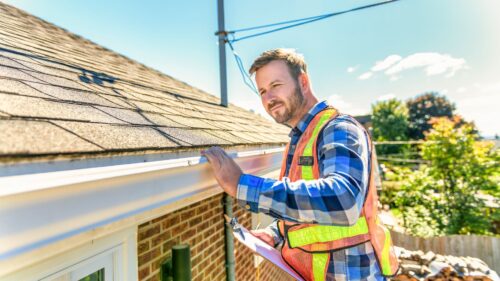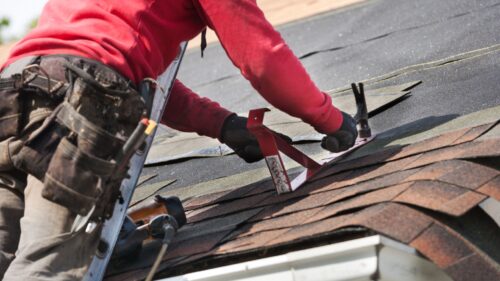Deciding on the right roofing company can feel like trying to find a needle in a haystack. With so many factors from costs, materials, and timelines at play, where do you even start? Whether you’re facing minor repairs or considering a full-scale replacement, understanding From Estimates to Execution: How to Navigate the Process of Hiring a Roofing Company is your first step towards ensuring that your home’s crown stays both sturdy and stylish.
The journey begins long before any contracts are signed or shingles are selected. First off, gear up with the right knowledge about how to nail that accurate estimate and learn to spot the real pros among your contractor options. But don’t fret; we’ve got your back every step of the way.
Understand the Roofing Estimation Process
Getting a handle on the roofing estimation process is key when you’re looking to hire a roofing contractor. You want to make sure you’re getting a fair deal and that the roofing company you choose is being upfront about all the costs involved.
Factors That Affect Roofing Estimates
A lot goes into a roofing estimate. The size and complexity of your roofing job will be a big factor. So will the type of roofing materials you choose. Roofing contractors have the experience to accurately estimate the cost and materials needed for each project, even tricky ones. They can spot potential issues and make sure the job stays on budget. When you contact roofing companies for an estimate, they should send someone out to thoroughly inspect your roof. They’re going to size up your roof, check out its current state, and suggest the best way forward. The estimator should be knowledgeable and able to clearly explain your options. They should also provide an extensive list of references to back up their expertise.
Questions to Ask Your Roofing Contractor
Don’t be shy about asking questions during the estimation process. Here are some important ones:
- Do you offer a free on-site inspection?
- Will you provide a written estimate?
- How much do repairs cost?
- Is your work covered by warranty?
- How do you keep projects on schedule?
- What’s your inclement weather policy?
- Do you handle disposal of old roofing materials?
- How do you handle payment and do you offer financing?
Finding clear answers to these questions can really boost your confidence when picking a roofing contractor.
Research and Compare Roofing Contractors
Don’t just go with the first roofer you find. Do your homework and compare a few different roofing contractors. A little research upfront can save you a lot of headaches down the road.
Check for Proper Licensing and Insurance
Job #1 is making sure any roofing contractor you’re considering is properly licensed and insured. Don’t take their word for it – verify that their insurance is active by contacting the insurance company directly. Some less scrupulous companies may claim to be insured when they’re not. You can check a roofer’s license through the National Roofing Contractor Association or your local building department. Online reviews and testimonials from past customers can tell you a lot about a roofing company. Check out their website and social media pages to see what people are saying. Are customers generally satisfied? Do they have a track record of quality work? You can also ask the company for references and follow up with those customers to get their honest feedback.
Compare Pricing and Services Offered
Of course, you’ll want to compare costs between contractors. But don’t just automatically go with the lowest bid. Consider the overall value and quality of service. Roofing companies with more experience and a great reputation may charge a bit more, but they may also be more likely to do the job right the first time. Look at what services each contractor offers. Some may provide extras like free consultations, discounts, or extended warranties.
Evaluate the Quality and Experience of Roofing Contractors
Beyond the basics of licensing and insurance, you want to dig a little deeper to assess the quality and experience of any roofing contractor you’re considering. Experience is key in the roofing business. Look for a contractor that’s been around for at least a few years and has a solid portfolio of completed projects. Ask for specific examples or case studies that are similar in scope to your project. A reputable roofing company should be happy to provide these.
Verify Insurance Coverage and Workers’ Compensation
Don’t forget to ask about insurance coverage beyond just general liability. The roofing contractor should carry workers’ compensation insurance for all their employees. This protects you from liability if a worker gets injured on your property. Ask for proof of insurance and make sure the policies are current.
Assess Communication and Professionalism
From your initial contact through the estimation process, pay attention to how the roofing contractor communicates with you. Are they professional, knowledgeable, and easy to get in touch with? Do they take the time to answer your questions thoroughly and transparently? Establishing clear communication from the get-go will make for a smoother roofing project overall.
Understand the Roofing Installation Process
Even if you don’t plan to get up on the roof yourself, it’s helpful to have a basic understanding of the roofing installation process. That way you’ll know what to expect and can ensure your roofing contractor is doing things right.
Overview of the Roofing Installation Steps
A typical roofing installation follows these general steps:
- Removal of existing roofing material
- Inspection and repair of roof decking
- Installation of underlayment and drip edges
- Installation of new roofing material
- Installation of flashing around chimneys, valleys, vents, etc.
- Sealing and cleanup of job site
- Final inspection
An experienced roofing contractor will be able to execute each of these steps properly for a high-quality, leak-free roof. The type of roofing material you choose (asphalt shingles, metal, tile, etc.) will determine the specific tools and techniques used in the installation. But in general, roofing contractors use a variety of hand tools, power tools, ladders, scaffolding, and safety equipment to get the job done. They’ll also use roofing underlayment, drip edge, nails, flashing, and sealants in addition to the main roofing material.
Safety Measures and Precautions
Roofing is inherently dangerous work. Be mindful though, as there’s always the chance of stumbling into falls, encountering cuts, feeling the sting of burns, or dealing with other types of injuries. So, it really boils down to making sure your roofing contractor sticks firmly to all the necessary safety measures. These include:
- Use of fall arrest systems and guardrails
- Proper use of ladders and scaffolding
- Use of personal protective equipment like hard hats, gloves, and eye protection
- Proper training for all workers
- Compliance with OSHA safety regulations
Don’t hesitate to ask your contractor about their safety record and procedures. A reputable roofer will make safety a top priority.
Prepare for Your Roofing Project
Before your roofing project kicks off, there are a few key things you need to do to prepare.
First up, schedule a comprehensive roof inspection. This will help identify any pre-existing issues that need to be addressed before the real work begins.
Schedule a Comprehensive Roof Inspection
A thorough roof inspection is crucial. It will reveal any water damage, storm damage, or other problems that could compromise your new roof.
Make sure to ask your contractor if they offer a free on-site inspection as part of their services.
Address Any Pre-existing Roof Issues
If the inspection uncovers any issues, now’s the time to fix them. Whether it’s repairing damaged decking or replacing rotted fascia boards, get it done before the new roof goes on.
Neglecting these problems will only lead to more headaches down the road. Trust me, you don’t want that.
Prepare Your Home and Landscaping
Roofing is a messy job. To minimize the chaos, take some time to prepare your home and yard.
Move any vehicles, outdoor furniture, or decorations out of the way. Cover your attic floor with plastic sheeting to catch debris. And don’t forget to prune any overhanging branches that could get in the roofers’ way.
A little prep work goes a long way in ensuring a smooth, stress-free roofing project. So don’t skip this crucial step.
Navigating the Roofing Contract and Agreement
Before any work begins, you’ll need to sign a contract with your chosen roofing company. But don’t just blindly put pen to paper.
Take the time to carefully review the agreement and make sure you understand every detail.
Key Components of a Roofing Contract
A solid roofing contract should include a few key things:
- Scope of work
- Materials to be used
- Project timeline
- Payment terms
- Warranty information
If anything is unclear or missing, don’t be afraid to ask questions. A reputable contractor will be happy to clarify.
Red Flags to Watch Out for in Agreements
As you go through the contract, stay sharp and watch for any warning signs. These could include:
- Vague or missing details
- Unrealistic promises
- Demands for large upfront payments
- Lack of insurance or licensing information
If something doesn’t feel right, trust your gut. It’s better to address concerns now than to sign a contract you’re not comfortable with.
Importance of Clear Communication and Understanding
Clear communication is key to a successful roofing project. Make sure you and your contractor are on the same page about every aspect of the job.
Don’t be shy about asking questions or voicing concerns. A good contractor will welcome your input and work with you to ensure you’re completely satisfied with the final result.
Ensuring Quality and Satisfaction in Roofing Execution
The ink’s dry on the contract, and we’re off to the races with getting things done. But your job as a homeowner isn’t done yet.
To ensure a top-quality result, you’ll need to stay involved throughout the roofing process.
Monitoring Progress and Quality Control
Make sure to stay tuned in and watch the project unfold step by step. If you notice anything that doesn’t seem right, bring it up with your contractor right away.
A reputable company will have quality control measures in place, but it never hurts to be vigilant. When you get down to it, this is about your home and the money you’re putting into it.
Addressing Concerns and Making Adjustments
Even with the best planning, issues can arise during a roofing project. The key is to address them promptly and professionally.
If you have concerns, schedule a meeting with your contractor to discuss them. A good company will work with you to find a solution and make any necessary adjustments.
Final Inspection and Customer Satisfaction
Once the job is complete, your contractor should conduct a thorough final inspection. Now’s their shot at making sure every little detail lives up to their sky-high expectations.
But the real measure of success is your satisfaction. Are you thrilled with your new roof? Do you feel like you got the high-quality workmanship and customer service you deserve?
If the answer is yes, then your roofing project was a resounding success. And if not? Don’t hesitate to speak up. A reputable contractor will go above and beyond to make things right.
FAQs in Relation to From Estimates to Execution: How to Navigate the Process of Hiring a Roofing Company
What is the first step in the roofing process?
Kick things off with a detailed roof inspection. This identifies what needs fixing or replacing.
What is the formula for estimate of roofing?
To ballpark your cost, multiply your roof’s square footage by material and labor rates. Adjust for complexity and height.
How do you know if your roofing contractor is ripping you off?
If quotes seem sky-high, details are murky, or pressure tactics are used, tread carefully. Always compare multiple bids.
How do roofers calculate labor?
Labor costs come from project size and difficulty. Roofers factor in hours needed then multiply by their hourly rate.
Conclusion
Every roof tells a story, but not all tales have happy endings if due diligence gets overlooked during hiring processes. From initially seeking out estimates right through execution phases when dreams transform into tangible outcomes – it’s clear; choosing wisely matters more than ever.
Your rooftop isn’t just another line item on household maintenance checklists; it’s protection against elements, insulation for comfort seasons after season, aesthetic charm defining your property’s curb appeal… essentially making or breaking house integrity itself! Recognizing this reality brings us closer together around shared goals—seeking quality craftsmanship over quick fixes always pays off down road paths less traveled by leaks (literally).
In essence,‘From Estimates To Execution’, navigating these waters ensures peace mind knowing well-built roofs above heads stand test time – because everyone deserves soundly sleep under stars they call home skies without worry overhead coverage fails them unexpectedly.
Go to costguide.com to compare roofing professionals near you!





